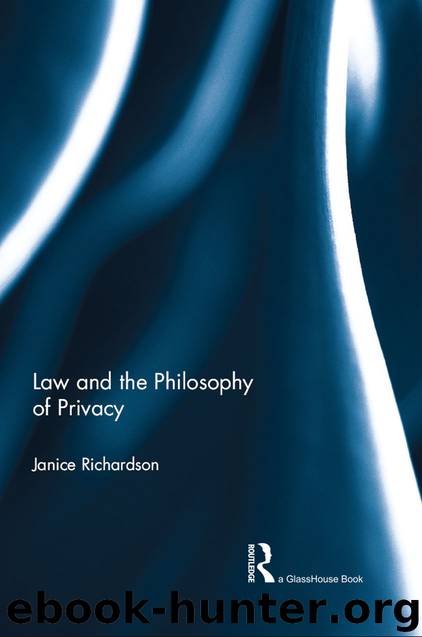Law and the Philosophy of Privacy by Richardson Janice

Author:Richardson, Janice
Language: eng
Format: epub
ISBN: 978-1-134-09758-6
Publisher: Taylor & Francis Ltd
Privacy as property: Posner
I will set the scene by briefly recalling the meaning of neo-liberalism of which law and economics is a part. As introduced in Chapter 3 and in the last chapter, neo-liberalism is not simply associated with traditional economic interests, such as support for a free market and the reduction of welfare and financial packages that increase the vulnerability of the third world poor (Harvey 2005). It marks a change in the way that people are governed, by extending a market rationality and techniques, usually employed by companies, both to the state and to individuals themselves (see Foucault 2008; Brown 2003). Individuals are encouraged to treat themselves as if they were corporations, calculating the profit and loss of any interaction, trying to amass ‘human capital’ and assessing risk.
Posner starts his application of a market approach to privacy with the following observation:
People invariably possess information, including the contents of communications and facts about themselves, that they will incur costs to conceal. Sometimes such information is of value to other people – that is other people will incur costs to discover it. Thus we have two economic goods, “privacy” and “prying”.
(Posner 1984, 333–334)
To facilitate a neo-liberal economic analysis, in which human relationships are viewed in market terms, he starts with a definition of (one aspect of) privacy: the concealment of information. Posner does not consider privacy as intrinsically good but as of instrumental value. He justifies prying in terms of rational self-interest (Posner 1984, 334) because it enables people to employ their knowledge of others, including their friends and colleagues, in order to evaluate them and to make future decisions concerning them. This fits with his view that there are markets in friendship and marriage as well as employment and that these markets are to be analysed in the same way. This neo-liberal approach marks a shift in framework, from an earlier contractual analysis of rights and duties associated with marriage contracts and employment contracts, to the treatment of these contracts (and the relationships that they create) purely in terms of markets. As discussed in Chapter 3, such a market analysis of marriage has much in common with feminist critiques, save that feminists were critical of marriage as a market, holding out the hope of intimate relationships amounting to more than cynical interactions. Pateman also illustrates the way in which such contracts created and sustained subordination, discussed in the last chapter. Posner’s generalised application of market analysis derives from Becker’s extended definition of economics as the study of the distribution of scarce resources. Without recognising the vast diversity of human interests and quirks, Becker expects to be able to rank everyone in order and expects that they will marry/befriend those of an appropriate grade (Foucault 2008, 228).1
Posner’s central argument is that requests that individuals’ privacy should be respected can be understood merely as attempts by individuals to mislead others, by placing themselves in a positive light. He conceives of this as a fraud in the market place of relationships. A piece of personal information is comparable to the description of a car for sale.
Download
This site does not store any files on its server. We only index and link to content provided by other sites. Please contact the content providers to delete copyright contents if any and email us, we'll remove relevant links or contents immediately.
| Comparative | Conflict of Laws |
| Customary | Gender & the Law |
| Judicial System | Jurisprudence |
| Natural Law | Non-US Legal Systems |
| Science & Technology |
American Kingpin by Nick Bilton(3876)
Future Crimes by Marc Goodman(3594)
The Meaning of the Library by unknow(2565)
Inside the Middle East by Avi Melamed(2352)
Why Nations Fail: The Origins of Power, Prosperity, and Poverty by Daron Acemoglu & James Robinson(2289)
On Tyranny by Timothy Snyder(2227)
Living Silence in Burma by Christina Fink(2068)
Putin's Labyrinth(2017)
The Mastermind by Evan Ratliff(1934)
The Smartest Kids in the World by Amanda Ripley(1855)
Think Like a Rocket Scientist by Ozan Varol(1815)
Law: A Very Short Introduction by Raymond Wacks(1739)
It's Our Turn to Eat by Michela Wrong(1728)
The Rule of Law by Bingham Tom(1690)
Philosophy of law a very short introduction by Raymond Wacks(1667)
Leadership by Doris Kearns Goodwin(1634)
A Dirty War by Anna Politkovskaya(1627)
Information and Communications Security by Jianying Zhou & Xiapu Luo & Qingni Shen & Zhen Xu(1617)
Civil Procedure (Aspen Casebooks) by Stephen C. Yeazell(1554)
